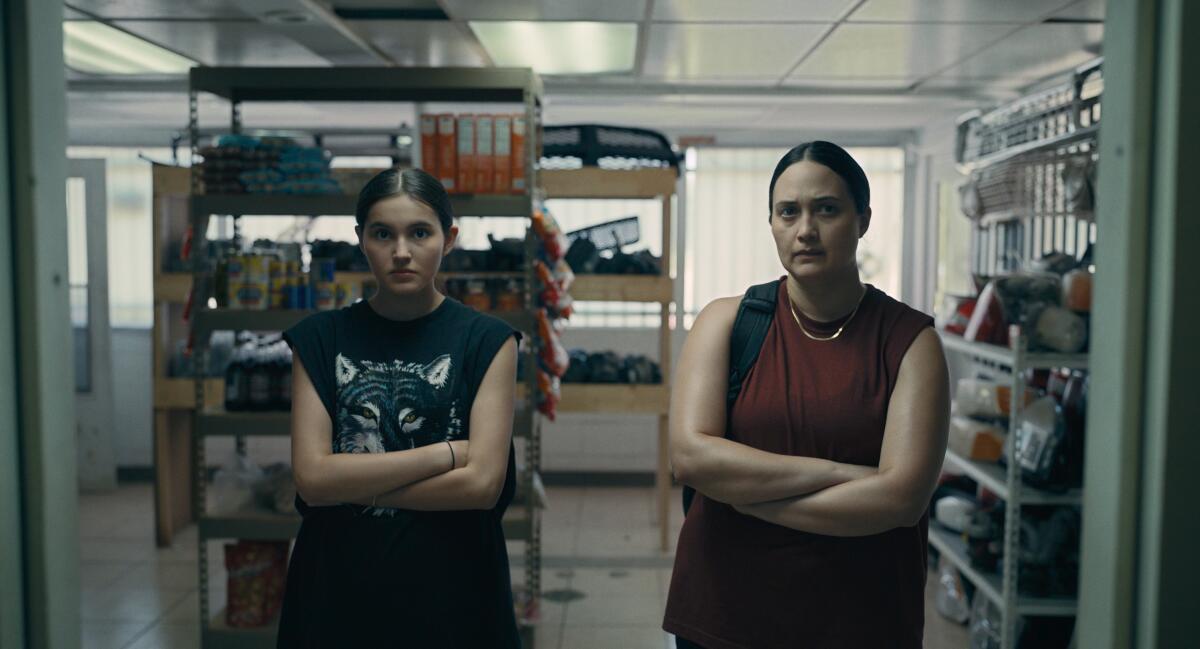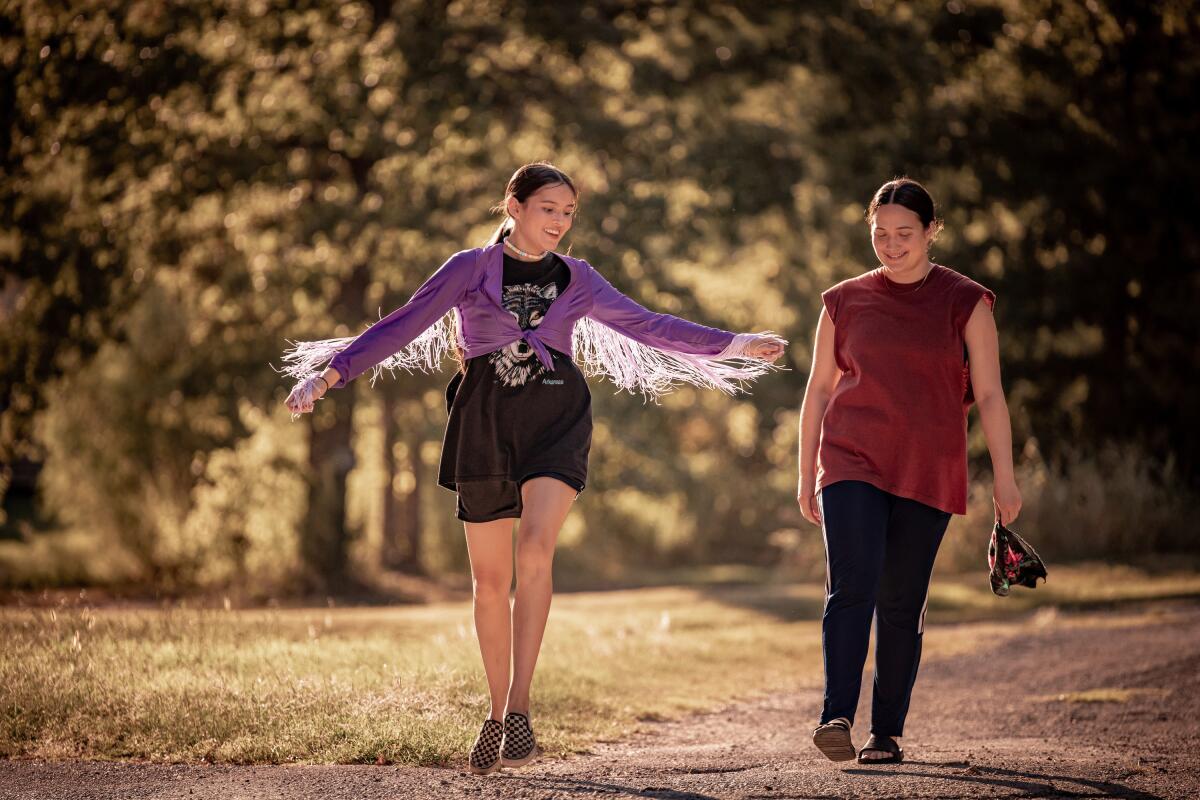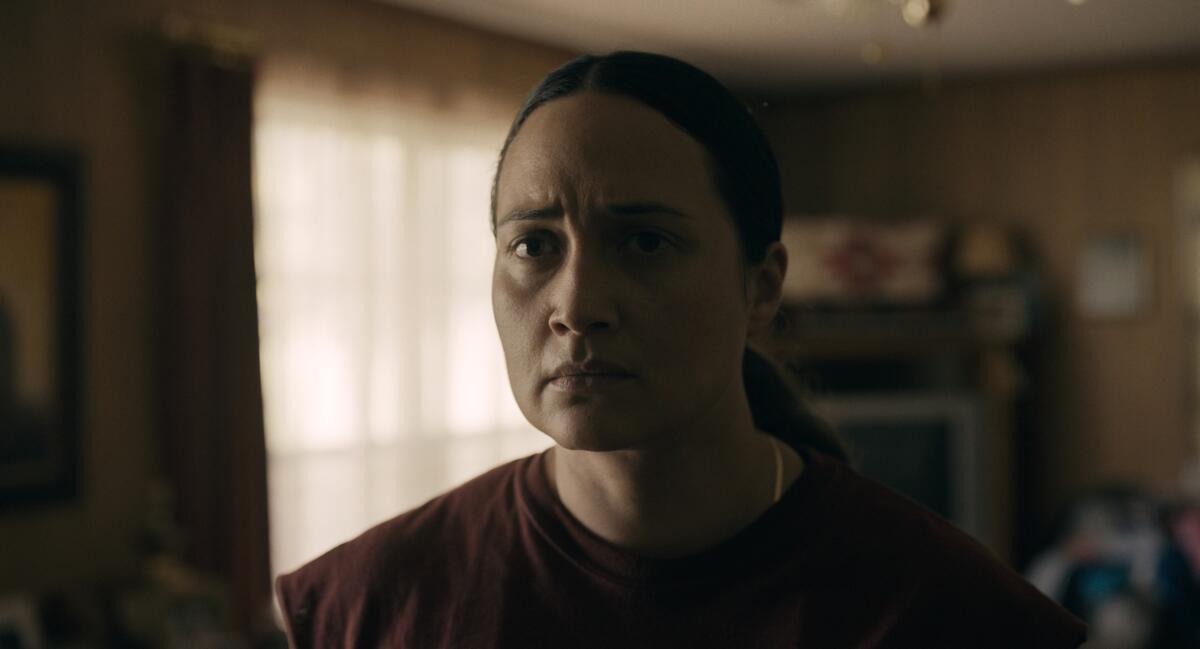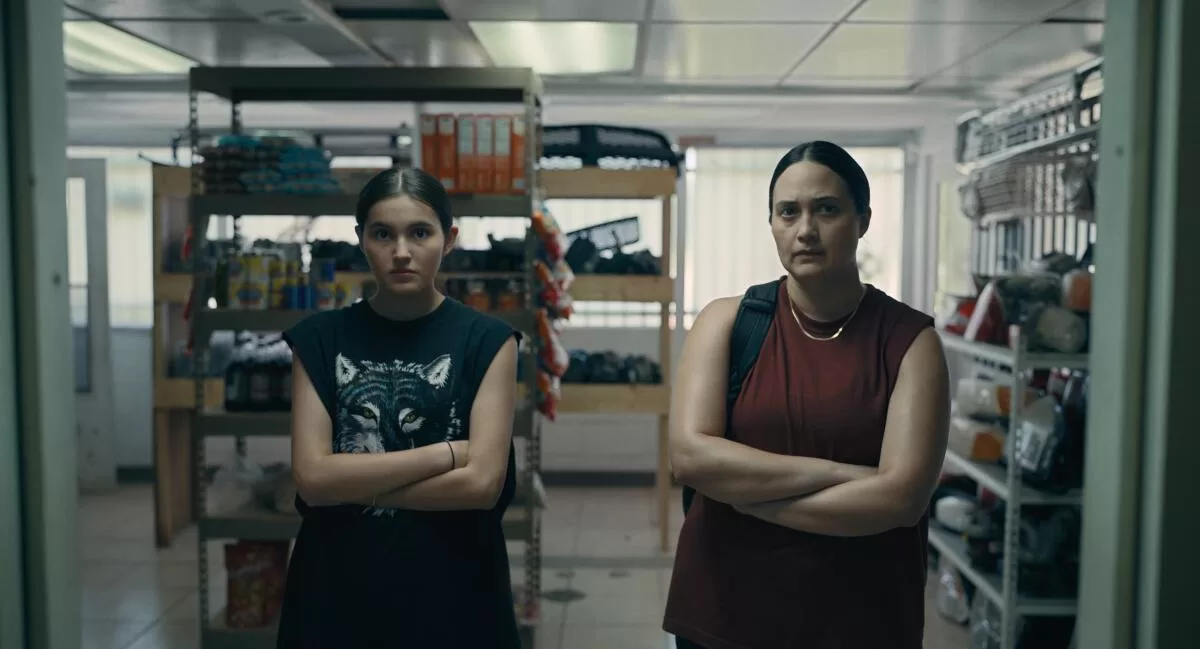After screening the film for an audience of Cayuga-language speakers in Toronto this past year, one of the elders grabbed her by the cheeks and told her “good job” in Cayuga.
“Some of them were crying because they’re in their 80s and 90s and they’ve never seen their language in a film before,” says Tremblay. “To me, that’s the biggest award that the film has received so far.”
“Fancy Dance,” which hits theaters Friday in limited release before arriving on Apple TV+ on June 28, follows Jax (Lily Gladstone) and her teenage niece Roki (Isabel Deroy-Olson), for whom she has been caring since the disappearance of Roki’s mother. As Jax juggles searching for her sister and helping Roki prepare for an upcoming powwow dance, authorities come to take Roki away from the reservation and place her with her white grandfather.
Directed by Tremblay, 43, who co-wrote the script with Tlingit screenwriter Miciana Alise, “Fancy Dance” marks the Seneca-Cayuga filmmaker’s narrative feature debut. The film premiered as part of the U.S. dramatic competition at the 2021 Sundance Film Festival in Park City, Utah. Like her 2020 short “Little Chief” (which also stars Gladstone), “Fancy Dance” is set in and around the Seneca-Cayuga reservation in Oklahoma.

(Apple TV+)
Tremblay, who has written and directed on series such as “Reservation Dogs” and “Dark Winds,” explains that she found inspiration for the film’s story while in a three-year-long language-immersion program studying Cayuga.
“We were learning familial words at the time and I learned that the word for mother is knó:ha’ and that the world for your auntie on your maternal side was knohá:’ah, which means ‘little mother’ or your ‘other mother,’” says Tremblay. “This beautiful matriarchy and the importance of matrilineal kinship was so brilliantly obvious in the language and it was so moving to me.”
Within Cayuga vocabulary and grammar and syntax, Tremblay was able to feel a connection to her culture in a new way. And it was also a reminder that it was not that long ago that her culture and its perspective on matriarchy was present and thriving.
Through Jax and Roki’s story, “Fancy Dance” touches on ongoing systemic issues affecting Indigenous women and their communities, such as the missing and murdered crisis and the forced removal of Native American children from their families. But primarily, “Fancy Dance” is Tremblay’s love letter to her culture and the Cayuga language.
“It’s just hitting me that in a few short days, the film will be available globally and Cayuga is going to be heard around the world,”she says during a recent video chat over Zoom. “This is a big deal. So I’m feeling gratitude and pride, which is sometimes hard for me to allow myself to feel.”
Tremblay discusses “Fancy Dance’s” Cayuga dialogue, the issues the film addresses and her optimism for the future of the industry below. This conversation has been edited for length and clarity.
Why was it important for you to use Cayuga in this film?
We’re at a place with our language, Cayuga, where there are less than 20 first-language speakers left. That’s dire. I think it’s considered close to extinct as a language. I’m not a fluent speaker. I’ll always be a language learner. But I have knowledge of the language and you can’t just hold it to yourself. It very much feels like a responsibility that, because I had the privilege to study in a language-immersion program, I have to do my part to pass it on.

Roki (Isabel Deroy-Olson), left, and Jax (Lily Gladstone) in “Fancy Dance.”
(Apple TV+ )
Jax and Roki’s relationship is at the heart of the movie. What I really enjoyed were the little routine moments they shared — moments of joy, like when Roki gets her first period.
It was really important to have those moments of joy and those moments of levity because that’s what it feels like in my community. I know so many Jaxes. I was raised by Jaxes and without those women and queer folks in my life, I wouldn’t be here. It’s through laughter and it’s through connection that you can transcend all of these things that are happening.
Both of my nieces and my nephew have all gotten their periods. My youngest niece just got her period this past month. It’s such a joyous occasion for us Haudenosaunee people. When [Roki and Jax] go to the diner and she orders all of the strawberry stuff, it was like when I got my period and we went to the Chinese buffet and I ordered sweet-and-sour chicken and all this stuff. We don’t get to celebrate menses enough.
I’m always happy to see cultures that celebrate periods because so often it feels like there’s a weird shame or embarrassment around it.
It’s so sad because there is. We have certain things that you can and can’t do when you’re on your period. It’s not shameful in our culture. When you’re on your period, there are certain things that you’re not allowed to be near or go around because you’re so powerful that you can disrupt it. Anthropologists tried to rewrite that, but it’s in the language, it’s in the ceremonies, it’s in the culture. I’m much more excited about accepting that than any sort of shame. I’m signing up for: I’m at my most powerful.
How did you approach balancing these topics that matter to you with making entertainment?
Miciana and I wrote this film and made this film for Native people. We wanted the film to be a film that’s by Native people, about Native people. When Native people watch this, they’re going to see things represented accurately and authentically that make them proud and that they can identify with. So, No. 1, the responsibility when we were making the film was to Native people and to not re-traumatize or trigger Native people when they watched the film.
For the non-Native audiences that will come to find this film, we wanted to be able to talk about issues that are happening in Indian country in the hope that people who watch this can be guided to these topics by way of channeling humanity versus hitting you over the head. Every one of us on this planet can identify with the themes of love and loss and grief. Hopefully through the ebb and flows of [Jax and Roki’s] love, the audiences will recognize these systemic issues that are impacting Native people in modern times and they will think about their relationships to these systems.

Lily Gladstone in the movie “Fancy Dance.”
(Apple TV+)
We’ve been in a period where it feels like there is more attention being paid to Native projects — like “Dark Winds” and “Reservation Dogs.” What has it been like for you to see and experience that growth? Has the momentum stopped?
I’m really grateful for Sierra Ornelas at “Rutherford Falls” and Sterlin Harjo [of “Reservation Dogs”] and Sydney Freeland [of “Echo”] and all of these incredible showrunners and directors that are working and are my mentors. They’re really pushing up against all odds and it’s so inspiring. It allows you to see yourself that way, to see yourself as a storyteller that can do this job for a living and that you can make stories about communities that you want to.
You don’t know if this is just a moment that Hollywood is having that will just go right back. With all the strikes and everything that happened, we’re still trying to find our footing in. What is the new Hollywood? What are the impacts of AI that are coming? All of this is really anxiety-inducing.
It’s really hard on these sets. I’ll often turn around on a tech scout and be the only woman. You might be working with collaborators that don’t want to listen to you because you’re a woman or you’re Indigenous or they just have this idea that you don’t have as much knowledge. That is very actively still happening and it f— sucks. But I have optimism that things are moving in the right direction.
But how do you make up for over 100 years of really deplorable, horrible behavior in, like, three seasons of TV? It’s going to take a lot more investment by Hollywood studios to make up for the bad behavior that existed for so long and that continues to exist. I always call on these studios and these companies: You can’t just say things out loud. You have to actually actively do things.
What that really means is writing checks. You have to actively employ people with money. It’s great you have these mentorship programs, but you have to hire these people and pay them and invest in their pitches and their ideas. There needs to be more active support from these institutions and we’re slowly seeing that happen. But we need more of that in order for this to not just be a fad. So ask me this question again in five years.
I’m impressed by your optimism.
I think as an industry, we’re all just holding on and hoping that we can get things back. My mom always taught me to be optimistic while also recognizing reality. I think that we can be optimistic and at the same time call out bad behavior from the studios and these systems. I want to work with them and I’m so excited when I do. Look at a show like “Reservation Dogs” — that’s a great example of how great work can come from these relationships and I’m excited to see more of that.
And I feel like my optimism is also a quality that I learned from the Jaxes in my life. When you look at Jax and Roki, the only way that they can get to the other side of what they’re facing is because they have optimism and they love each other. They know that they can get themselves guided through this life as long as they rely on each other. I feel the same way about the work that Sterling’s doing and the work that I’m doing and Tazbah [Chavez] and all of these incredible filmmakers. The only way we get to the other side of this is by linking hands and doing it together. And that comes from being inspired by these incredible Native people that I know and love that are sustaining much more.
I go home [to the Seneca-Cayuga reservation] and there’s a person missing. That’s a way bigger f— deal than not getting hired in Hollywood. But it’s through laughter, through love, through humanity, through holding hands that we get to the other side of it. We’re going to survive Hollywood. We’ve survived way worse.
